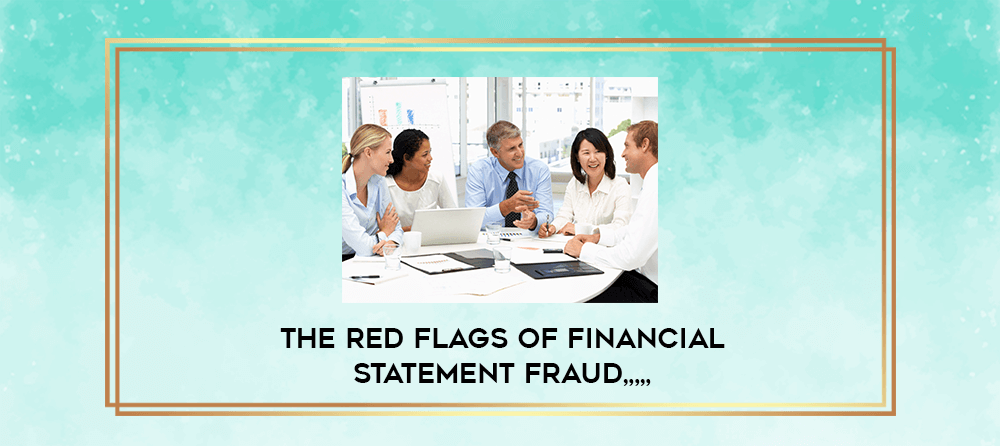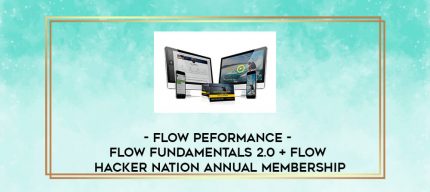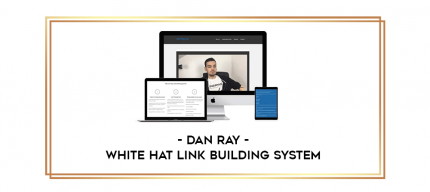The Red Flags of Financial Statement Fraud
Course Description
Archive : The Red Flags of Financial Statement Fraud Digital Download
Salepage : The Red Flags of Financial Statement Fraud
Delivery : Online With Any Device
Let’s get down to business and the issues CPAs face in industry. As the most engaged advisor in a company’s financial health, how do you handle the factors not quantified on a P&L or real-world exchanges that don’t follow IRS definitions to a tee?
- Financial statement fraud accounts for 10% of all white-collar crime, can you spot the red flags?
- IT continues to impact the risk in the financial realm – determine a budget for your specific IT needs.
- Leverage the unquantifiable factors of financial statements to build organizational value.
Beyond P&L: The Elements Driving the Value of Your Business
Financial statements are among the most scrutinized set of documents present in the sale of a business. While the CPA is the most directly engaged advisor in a company’s financial health, factors such as personal goodwill, scalability and recurring revenue, to name a few, are not quantified by financial statements. Understanding the importance of these factors and how to leverage them toward developing your business strategy can make all the difference in building organizational value.
Jason D. Tuzinkewich, MBA, M&MI, CM&AP, CBI – CEO, Blue Sky Business Resources, Sandy, UT
1031 Tax Deferral for Investment Real Estate: Rules, Options and Best Practices
1031 Exchanges for Investments Real Estate has been savings taxpayers millions in taxes since 1921. Proper planning, implementation and reporting is worth the time. In this session we review the rules, discuss replacement options for sellers, explore the different levels of taxes being deferred, and how it all fits in with estate planning. Finally, we walk through a live tax return demonstrating the various reporting obligations and the ease at which these money saving transactions can be used. A must attend for anyone with clients holding investment or business real estate.
Mark Kosanke, CPA – Registered Securities Principal & President, Concorde 1031, Concorde Financial Group, Troy
CFOs New Role in the Age of Digital Transformation
Today’s digital transformation is not only changing the business landscape as we know it, but also the dynamics of competition. According to McKinsey & Co., companies adhering to new digital rules are creating 5-times more revenue with 8-times more operational profit during the same period. The executive leaders charged with managing IT in their organizations are directly accountable for making this transformation happen. Learn more about this shift and how leading-edge IT management services are impacting organizations that are ready to become digital leaders.
David W. Townsend – President & COO, Awecomm Technologies LLC, Troy
Brent Yax – CEO, Awecomm Technologies LLC, Troy
I Spy with My Little Eye … an Illegality
In the fight against global corruption, accountants are being asked to be more forthcoming when they discover information or evidence that points to illegal or prohibited activities. This ethics workshop considers new international professional ethics proposals for responding to non-compliance with laws and regulations (NOCLAR).
Albert D. Spalding, Jr. – Associate Professor, Mike Illitch School of Business Administration, Wayne State University, Detroit
Examining Internal Control Systems: Where Judgement Meets Procedure
Accountability is more important than ever in today’s fast-paced, technology-driven business world. Establishing an effective internal controls system can be the difference between success and failure, but it’s more than just policy and procedure. Five essential components to help you measure the effectiveness of the internal controls within your business, regardless of size.
Mary M. Kreider, CPA, CPPM – Senior Manager, Yeo & Yeo, Saginaw
The Red Flags of Financial Statement Fraud
Ten percent of white-collar crime incidents are financial statement fraud. While corruption and asset misappropriation account for a much larger share, their repercussions are far less impactful. Learn how to detect financial statement fraud and protect your investments by examining it’s five basic types and their red flags.
Sarah L. Jennings, CPA, CFE – Shareholder, Maner Costerisan, P.C., Lansing
Basic Course Information
Learning Objectives
- Financial statement fraud accounts for 10% of all white-collar crime, can you spot the red flags?
- IT continues to impact the risk in the financial realm – determine a budget for your specific IT needs
- Leverage the unquantifiable factors of financial statements to build organizational value
Major Subjects See Description
Sarah currently serves as a principal in the firm’s Accounting and Outsourced Solutions department, leads Maner Costerisan’s fraud and forensics practice and the director of Maner Costerisan’s nonprofit committee. Sarah oversees outsourced solutions engagements providing guidance and advisory services to client leadership and teams on financial analysis, projections and workflow. She has particular specialization performing fraud risk assessments and internal control process improvements for organizations across various industries. Sarah maintains a strong desire to help her clients augment their internal controls and fraud prevention systems, while minimizing their costs in the process. Sarah also performs examinations for various organizations to determine and document the extent of loss due to fraud.
Beyond her client responsibilities at Maner Costerisan, Sarah regularly shares her expertise with colleagues and peers by speaking on industry related topics including fraud (risk areas and prevention), financial oversight, board governance and ethics.
Sarah volunteers her time with various charitable organizations primarily focused on leadership and entrepreneurism.
Sarah resides in Laingsburg, Michigan with her husband, Russ, and their son, Kannon. In her free time, she enjoys gardening, cooking, and playing golf.
























Reviews
There are no reviews yet.